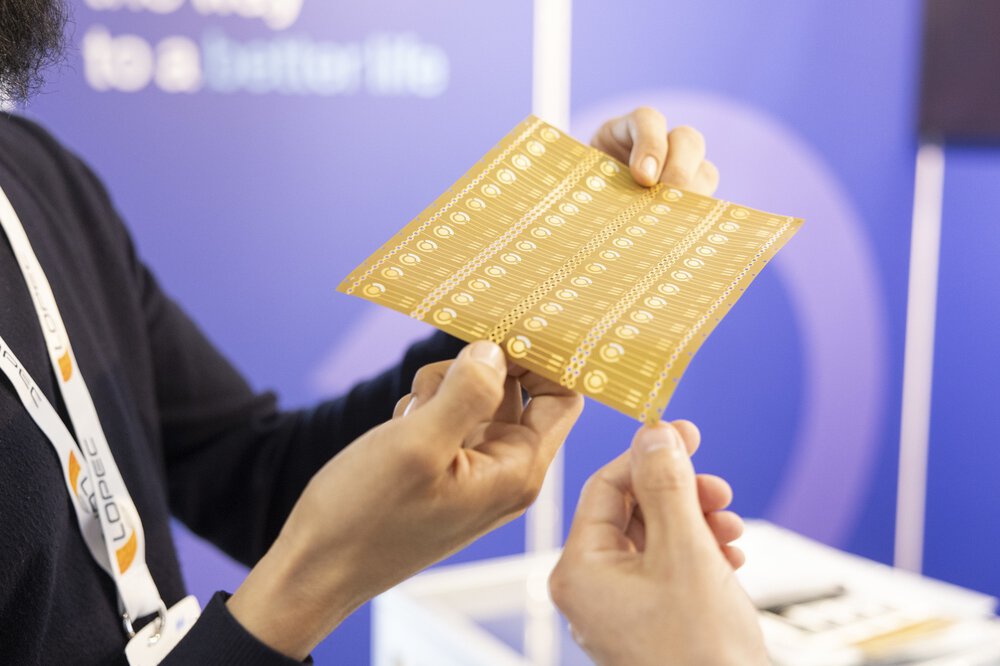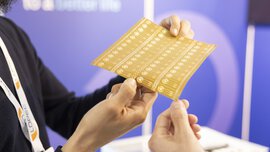Interview about Printed Electronics and AI: New applications for medical technology
January 16, 2025
Professor Luigi Occhipinti from the University of Cambridge holds a talk at LOPEC 2025 in Munich. In his presentation, he will focus on sustainable wearable electronics. New materials as well as AI and efficient data processing are essential for that, as he emphasized in an interview ahead of the event.
Professor Occhipinti, you are Director of Research in Smart Electronics, Biosystems and AI at the University of Cambridge. The combination of these three areas sounds very promising. What are you researching, and what role does printed electronics play in that?
Prof. Occhipinti: Indeed, my research focus is centered around the field of smart electronic system integration built upon unconventional electronic materials and sustainable fabrication processes. In the past two decades, I have contributed to advancements in different types of printed electronics manufacturing. This includes the formulation of inks as well as the integration of components made from conductive and semiconductive polymers, but also from quantum dot materials, graphene and other two-dimensional materials. We combine the unique properties of these materials with novel biomimetic device concepts and secure, energy and computationally efficient data processing. Thus, we enable breakthroughs in multiple application areas with a positive impact on society, such as wearable health monitoring and assistive devices.
What are you working on specifically?
Our recent work includes, for instance, a smart choker device with ultrasensitive biophysical sensors printed on natural textile substrates. This device combines advanced AI-powered data processing and communication to assist individuals with breathing and sleeping conditions, or speech impairments, whether in hospital or at home.
Where do you see the greatest potential for smart printed electronics?
My vision is next-generation wearable systems that integrate multimodal sensing, energy-efficient AI, neuromorphic data processing, and sustainable energy harvesting and storage. By combining these technologies into printed, flexible and textile-based wearable smart systems, we are supporting effective clinical intervention and personalized assistance. E-textiles, in particular, integrate functional materials into flexible, stretchable garments. Such skin-compatbile wearable electronics adapt seamlessly to the human body to help tackle actual healthcare needs or enable other daily life applications.
More and more products are being equipped with printed electronics. Nevertheless, they must remain recyclable. How can that be achieved?
Adopting sustainable-by-design approaches is central to my research. We repurpose textiles as electronic substrates, incorporating eco-friendly materials and additive manufacturing. These methods reduce environmental impact while enabling scalable, cost-effective production that is well-aligned to our industry partners’ capabilities.
Another challenge is that electronics need power. How can we keep our energy consumption within limits despite the increasing electronic functionalization of everyday things?
To address increasing power demands, we are exploring ambient energy harvesting—from the body or the environment—and using it to power ultra-low-power devices. Additionally, we are developing computationally efficient AI and brain-inspired architectures to process data locally, securely, and sustainably.
Sustainability is the focus of your plenary lecture at the LOPEC Conference. What will you be talking about?
I will be discussing sustainable innovation in smart electronics and technologies that align with the goals of a “green” Moore’s law. I will be focusing on energy efficiency, multimodal sensor technology, the use of AI in wearables, and digital twins of the human body. The goal is to reverse the growing energy demands of AI and the Internet of Things.
What do you expect from LOPEC 2025?
I look forward to exchanging ideas with the audience and exploring future development opportunities with participants in this unique event to achieve decisive breakthroughs.
The plenary lecture ‘AI-Driven Wearable Tech and Neuromorphic Sensors: Advancing Sustainable Smart Edge Devices’ by Luigi Occhipinti will take place on February 27, 2025 at 9.50 a.m. in Room 5 of the ICM - International Congress Center Messe München.
Downloads
199515
Belonging images





- PR Manager

- Press & Public Relations Manager OE-A
